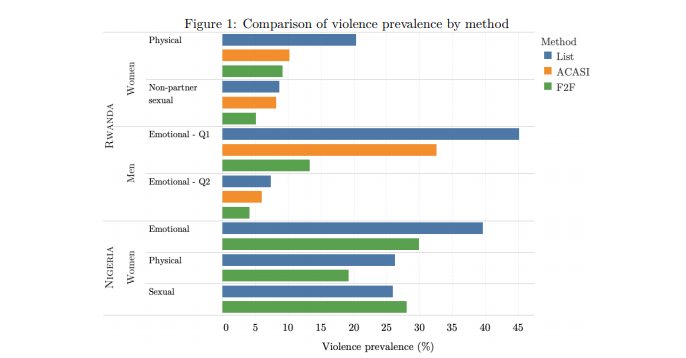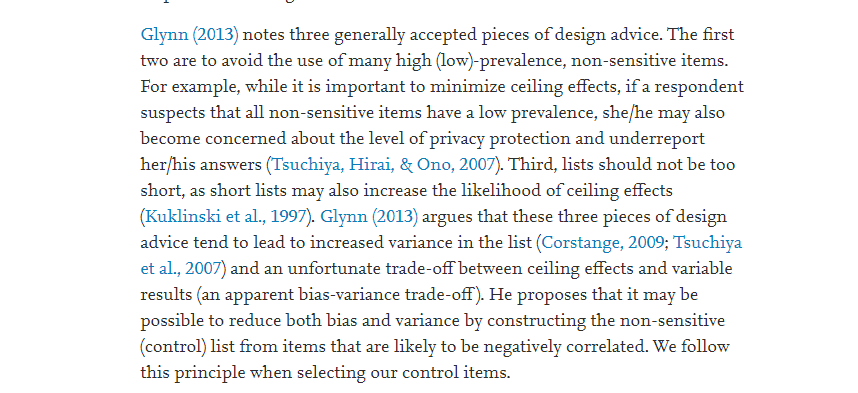Studies using list randomization to measure #VAW in the last few years has  https://abs.twimg.com/emoji/v2/... draggable="false" alt="📈" title="Tabelle mit Aufwärtstrend" aria-label="Emoji: Tabelle mit Aufwärtstrend">
https://abs.twimg.com/emoji/v2/... draggable="false" alt="📈" title="Tabelle mit Aufwärtstrend" aria-label="Emoji: Tabelle mit Aufwärtstrend">
Inspired by recent papers, a https://abs.twimg.com/emoji/v2/... draggable="false" alt="🧵" title="Thread" aria-label="Emoji: Thread"> of some notables + what I& #39;ve learned from reading them!
https://abs.twimg.com/emoji/v2/... draggable="false" alt="🧵" title="Thread" aria-label="Emoji: Thread"> of some notables + what I& #39;ve learned from reading them!
[Throw-back to blog summarizing early work on @UNICEFInnocenti w/ @TiaPalermo https://abs.twimg.com/emoji/v2/... draggable="false" alt="👇🏽" title="Rückhand Zeigefinger nach unten (mittlerer Hautton)" aria-label="Emoji: Rückhand Zeigefinger nach unten (mittlerer Hautton)">]
https://abs.twimg.com/emoji/v2/... draggable="false" alt="👇🏽" title="Rückhand Zeigefinger nach unten (mittlerer Hautton)" aria-label="Emoji: Rückhand Zeigefinger nach unten (mittlerer Hautton)">]
1/n https://blogs.unicef.org/evidence-for-action/measuring-taboo-topics-list-randomization-for-research-on-gender-based-violence/">https://blogs.unicef.org/evidence-...
Inspired by recent papers, a
[Throw-back to blog summarizing early work on @UNICEFInnocenti w/ @TiaPalermo
1/n https://blogs.unicef.org/evidence-for-action/measuring-taboo-topics-list-randomization-for-research-on-gender-based-violence/">https://blogs.unicef.org/evidence-...
Why use a list to measure violence instead of [or in addition to] direct measures? I& #39;ve seen two main reasons:
1) if you cannot meet the ethical req for asking direct measures
2) if you& #39;re worried abt under-reporting [esp if your intervention might increase reporting]
2/n
1) if you cannot meet the ethical req for asking direct measures
2) if you& #39;re worried abt under-reporting [esp if your intervention might increase reporting]
2/n
Lists were used during COVID-19 when ethical risks have been too high to ask questions directly
Most recently @yloxford included these in Peru & India asking youth about family violence - finding increases - https://abs.twimg.com/emoji/v2/... draggable="false" alt="🧵" title="Thread" aria-label="Emoji: Thread">on #Peru
https://abs.twimg.com/emoji/v2/... draggable="false" alt="🧵" title="Thread" aria-label="Emoji: Thread">on #Peru  https://abs.twimg.com/emoji/v2/... draggable="false" alt="🇵🇪" title="Flagge von Peru" aria-label="Emoji: Flagge von Peru"> findings by @MartaFavara
https://abs.twimg.com/emoji/v2/... draggable="false" alt="🇵🇪" title="Flagge von Peru" aria-label="Emoji: Flagge von Peru"> findings by @MartaFavara  https://abs.twimg.com/emoji/v2/... draggable="false" alt="👇🏽" title="Rückhand Zeigefinger nach unten (mittlerer Hautton)" aria-label="Emoji: Rückhand Zeigefinger nach unten (mittlerer Hautton)">
https://abs.twimg.com/emoji/v2/... draggable="false" alt="👇🏽" title="Rückhand Zeigefinger nach unten (mittlerer Hautton)" aria-label="Emoji: Rückhand Zeigefinger nach unten (mittlerer Hautton)">
3/n https://twitter.com/MartaFavara/status/1383771454592872461">https://twitter.com/MartaFava...
Most recently @yloxford included these in Peru & India asking youth about family violence - finding increases -
3/n https://twitter.com/MartaFavara/status/1383771454592872461">https://twitter.com/MartaFava...
. @ebert_cara & @jisteinert also use lists to collect measures of severe physical & sexual violence against women & children within an online survey - motivated by ethical concerns  https://abs.twimg.com/emoji/v2/... draggable="false" alt="👇🏽" title="Rückhand Zeigefinger nach unten (mittlerer Hautton)" aria-label="Emoji: Rückhand Zeigefinger nach unten (mittlerer Hautton)">
https://abs.twimg.com/emoji/v2/... draggable="false" alt="👇🏽" title="Rückhand Zeigefinger nach unten (mittlerer Hautton)" aria-label="Emoji: Rückhand Zeigefinger nach unten (mittlerer Hautton)">
4/n https://twitter.com/a_peterman/status/1374027878065606658">https://twitter.com/a_peterma...
4/n https://twitter.com/a_peterman/status/1374027878065606658">https://twitter.com/a_peterma...
Others used lists as robustness checks on direct measures in IEs
In Bolivia & Ethiopia lists confirm impacts on direct reports of violence against girls & IPV, respectively
Bolivia @diegoubfal @selimgulesci: http://documents1.worldbank.org/curated/en/498221613504523709/pdf/Can-Youth-Empowerment-Programs-Reduce-Violence-against-Girls-during-the-COVID-19-Pandemic.pdf
Ethiopia">https://documents1.worldbank.org/curated/e... @kotsadam: https://www.cesifo.org/DocDL/cesifo1_wp8108.pdf">https://www.cesifo.org/DocDL/ces...
In Bolivia & Ethiopia lists confirm impacts on direct reports of violence against girls & IPV, respectively
Bolivia @diegoubfal @selimgulesci: http://documents1.worldbank.org/curated/en/498221613504523709/pdf/Can-Youth-Empowerment-Programs-Reduce-Violence-against-Girls-during-the-COVID-19-Pandemic.pdf
Ethiopia">https://documents1.worldbank.org/curated/e... @kotsadam: https://www.cesifo.org/DocDL/cesifo1_wp8108.pdf">https://www.cesifo.org/DocDL/ces...
What do we learn methodologically from list studies?
First, most evidence points to under-reporting in standard surveys - including for IPV
Nice paper by @ccullen_1 shows lists generally result in https://abs.twimg.com/emoji/v2/... draggable="false" alt="⬆️" title="Pfeil nach oben" aria-label="Emoji: Pfeil nach oben"> prevalence in #Nigeria & #Rwanda
https://abs.twimg.com/emoji/v2/... draggable="false" alt="⬆️" title="Pfeil nach oben" aria-label="Emoji: Pfeil nach oben"> prevalence in #Nigeria & #Rwanda
https://openknowledge.worldbank.org/handle/10986/33876
6/n">https://openknowledge.worldbank.org/handle/10...
First, most evidence points to under-reporting in standard surveys - including for IPV
Nice paper by @ccullen_1 shows lists generally result in
https://openknowledge.worldbank.org/handle/10986/33876
6/n">https://openknowledge.worldbank.org/handle/10...
Similarly @Aure_Lepine et al. find direct surveys underestimate IPV by 16–20 pps as compared to list randomization measures in Burkina Faso  https://abs.twimg.com/emoji/v2/... draggable="false" alt="🇧🇫" title="Flage von Burkina Faso" aria-label="Emoji: Flage von Burkina Faso"> in @socscimed
https://abs.twimg.com/emoji/v2/... draggable="false" alt="🇧🇫" title="Flage von Burkina Faso" aria-label="Emoji: Flage von Burkina Faso"> in @socscimed
https://www.sciencedirect.com/science/article/pii/S0277953620305451
7/n">https://www.sciencedirect.com/science/a...
https://www.sciencedirect.com/science/article/pii/S0277953620305451
7/n">https://www.sciencedirect.com/science/a...
But, not always!
@taitarasu & @VeronicaFrisan1 compare item by item for IPV in the DHS vs list methods in Peru - so clearly these gaps vary by context, population, including levels of social norms & stigmatization around violence
8/n https://twitter.com/a_peterman/status/1363883786576949248">https://twitter.com/a_peterma...
@taitarasu & @VeronicaFrisan1 compare item by item for IPV in the DHS vs list methods in Peru - so clearly these gaps vary by context, population, including levels of social norms & stigmatization around violence
8/n https://twitter.com/a_peterman/status/1363883786576949248">https://twitter.com/a_peterma...
This work can help us understand IPV in numerous ways, including [but not limited to]:
1) understanding biases in reported data & what characteristics are linked to under-reporting
2) provide robustness checks & alternative analyses for IEs
A useful tool in the toolbox.
9/n
1) understanding biases in reported data & what characteristics are linked to under-reporting
2) provide robustness checks & alternative analyses for IEs
A useful tool in the toolbox.
9/n
But, their design & implementation can be tricky
@EconCath et al& #39;s new paper provides a nice summary of technical issues related to "control" item selection, including:
* Avoid high (low) prev control items
* Include neg corr control items
10/n
https://www.sciencedirect.com/science/article/pii/S2352827321000677">https://www.sciencedirect.com/science/a...
@EconCath et al& #39;s new paper provides a nice summary of technical issues related to "control" item selection, including:
* Avoid high (low) prev control items
* Include neg corr control items
10/n
https://www.sciencedirect.com/science/article/pii/S2352827321000677">https://www.sciencedirect.com/science/a...
This often requires piloting control items to figure out what the prevalence is (likely) to be in the population & how they are correlated with each other to avoid ceiling & floor effects
In addition, to avoid contrast effects - control items should not "stand out"
11/n
In addition, to avoid contrast effects - control items should not "stand out"
11/n
This is no easy task when the sensitive item is violence-related
Another issue relates to the efficiency of list estimates [SEs can be large!]
@Aure_Lepine et al.& #39;s paper shows using & #39;double lists& #39; [vs single] https://abs.twimg.com/emoji/v2/... draggable="false" alt="⬆️" title="Pfeil nach oben" aria-label="Emoji: Pfeil nach oben"> precision of estimates by 40%
https://abs.twimg.com/emoji/v2/... draggable="false" alt="⬆️" title="Pfeil nach oben" aria-label="Emoji: Pfeil nach oben"> precision of estimates by 40%
https://www.sciencedirect.com/science/article/pii/S0277953620305451
12/n">https://www.sciencedirect.com/science/a...
Another issue relates to the efficiency of list estimates [SEs can be large!]
@Aure_Lepine et al.& #39;s paper shows using & #39;double lists& #39; [vs single]
https://www.sciencedirect.com/science/article/pii/S0277953620305451
12/n">https://www.sciencedirect.com/science/a...
This is particularly an issue when using lists in an IE
Another drawback is the logistical limitation in terms of indicator choice --> A list can only contain 1 violence question
Yet, the typical IPV gold standard combines many different behavioral measures
13/n
Another drawback is the logistical limitation in terms of indicator choice --> A list can only contain 1 violence question
Yet, the typical IPV gold standard combines many different behavioral measures
13/n
This makes comparability hard & as clearly a few list indicators do not equate to gold standard aggregates (even if they are under-reported!)
Also, some ethical questions left "hanging" --> do methods like lists [alone] mean no recommended violence protocols are needed?
14/n
Also, some ethical questions left "hanging" --> do methods like lists [alone] mean no recommended violence protocols are needed?
14/n
Obviously lots to learn for violence community on lists [& other methods to encourage safe disclosure] - which I find super exciting!
Please add any of your fav list studies for violence that I& #39;ve missed. . .
end/
Please add any of your fav list studies for violence that I& #39;ve missed. . .
end/

 Read on Twitter
Read on Twitter prevalence in #Nigeria & #Rwanda https://openknowledge.worldbank.org/handle/10..." title="What do we learn methodologically from list studies?First, most evidence points to under-reporting in standard surveys - including for IPVNice paper by @ccullen_1 shows lists generally result in https://abs.twimg.com/emoji/v2/... draggable="false" alt="⬆️" title="Pfeil nach oben" aria-label="Emoji: Pfeil nach oben"> prevalence in #Nigeria & #Rwanda https://openknowledge.worldbank.org/handle/10..." class="img-responsive" style="max-width:100%;"/>
prevalence in #Nigeria & #Rwanda https://openknowledge.worldbank.org/handle/10..." title="What do we learn methodologically from list studies?First, most evidence points to under-reporting in standard surveys - including for IPVNice paper by @ccullen_1 shows lists generally result in https://abs.twimg.com/emoji/v2/... draggable="false" alt="⬆️" title="Pfeil nach oben" aria-label="Emoji: Pfeil nach oben"> prevalence in #Nigeria & #Rwanda https://openknowledge.worldbank.org/handle/10..." class="img-responsive" style="max-width:100%;"/>



